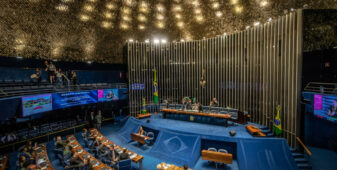Insight Focus
- Shell, Nestle among companies turning away from carbon offsets
- Media reports raise quality concerns over some carbon reduction projects
- UN and many emerging economies still planning to set up carbon offset markets
Last month oil giant Shell’s new CEO appeared to suggest that the company would soft-pedal its strategy to buy up to $100 million a year of carbon credits to offset its greenhouse gas emissions. Other major businesses are also rolling back on carbon credit commitments, as media-fuelled concerns over the environmental effectiveness of carbon offsetting continue to spread.
Most recently Fortescue Metals Group, the world’s fourthlargest iron ore producer, said it would also stop buying carbon credits after spending $6.2 million in 2023 on voluntary offsets and reporting that it had surrendered 336,833 credits.
High-profile brand names including Nestle, Gucci and easyjet have also announced they have stopped or will shortly wind down their voluntary purchases of carbon offsets to balance out their unavoidable emissions.
These and other companies are fighting shy of media reports that many carbon offsets do not represent real, verifiable and permanent reductions in greenhouse gas emissions.
Investigations this year by The Guardian and other agencies have alleged that projects to reduce deforestation – known as REDD+ projects – overstate their results and consequently the credits they are issued with do not represent real emission reductions.
Standards organisations that oversee REDD+ projects have defended the methodologies that govern the carbon accounting of these projects, saying that criticisms are based on a very narrow set of data from individual projects.
REDD+ projects represent a significant share of the carbon credit market. According to Trove Research REDD+ credits accounted for 40% of global supply in 2021.
Other project types including planting new forests,improved land management or energy efficiency are not facing the same level of criticism.
The voluntary carbon market is not governed by any national regulations, but multi-stakeholder initiatives like the Integrity Council for the Voluntary Carbon Market and the Voluntary Carbon Market Integrity initiative are setting out quality thresholds and criteria that are expected to drive greater confidence and trust in carbon offsetting.
And at the same time, an emerging class of carbon instrument – carbon removals – is gaining in popularity among buyers and could in the long term replace carbon reductions as the primary credit for corporate use.
Carbon removals represent greenhouse gases that are captured and stored or transformed to remove them from the atmosphere. Carbon capture and storage (CCS) is a well-known technology, which has been used primarily to boost oil extraction from declining wells, but is also being developed as a way to store greenhouse gases.
Planting new forests, restoring mangroves or improving land and forest management are also emerging classes of carbon removals that are gaining in popularity among buyers.
While some types of voluntary carbon offsets are being questioned, the United Nations is working hard to establish its own worldwide carbon credit market, and a host of countries are putting regulations in place to govern the trade in these UN offsets, and even to set up their own mandatory markets.
Countries ranging from Indonesia and Kenya to Vietnam and Brazil are also planning to set up their own domestic compliance markets, which will require companies to buy and surrender carbon credits covering their verified carbon emissions each year.
The development of the UN market will offer project developers the opportunity of building carbon projects to supply voluntary, regional compliance or UN carbon markets, and the scale, scope and growth of these emerging markets may persuade those large corporations that are retreating from carbon offsets to reboot their climate strategies.









